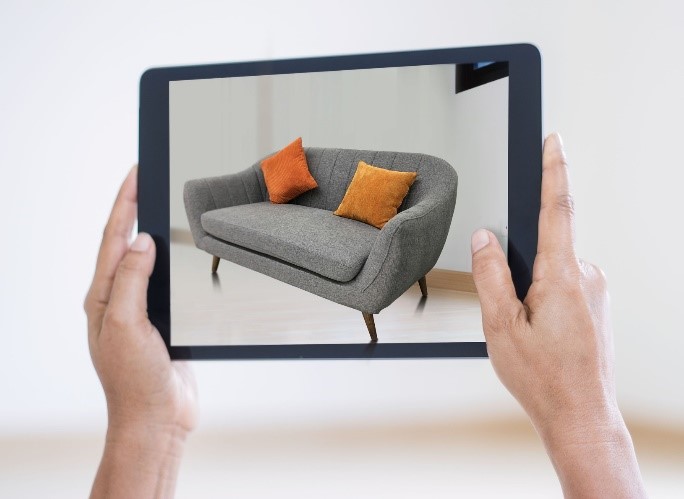Smaller Store-footprints Demand More Technology
Originally posted on TruCommerce.
In a recent blog post, Clint Engel, Senior Retail Editor of Furniture Today, highlighted the trend of furniture stores opening smaller locations and incorporating technology with the in-store buying experience. From augmented reality to touchscreen stations, retailers are betting on these amenities to reduce sales lost to online retailers while maximizing options for buyers.
One of the recent forays into the smaller, tech-focused furniture stores is Canada-based Leon’s Furniture. “We want to combine the convenience of online shopping with the trusted assistance and customer service that Leon’s is known for,” said Mike Walsh, divisional president of Leon’s.
According to a Leon’s spokesperson, their first small-scale store opened in June and surpassed opening day sales projections by 37% and was their largest store opening in British Columbia. This success mirrors trends seen in the United States with Ikea and Ethan Allen opening stores that focus on selling wares via technology, and in spaces that are a fraction of their traditional footprint.
Once thought of as an in-store-only purchase, furniture is becoming a major player in e-commerce. Business Insider reported the U.S. furniture retail category as one of the fastest growing segments in e-commerce in 2016, with an estimated $38 billion spent ononline purchases. However, they also highlighted the challenges of fulfillment such as “[h]andling oversized packages slows down delivery times and decreases potential volume as they take up more space on a truck.” To offset shipping inefficiencies, delivery companies like UPS and FedEx charge higher handling fees for large items. For retailers, this means implementing solutions that enhance the overall customer experience without eroding margins.
One such method is employing a direct-ship to consumer solution. Regardless of point-of-sale (in-store, phone, online), a purchase order is automatically generated and communicates with existing e-commerce and back office systems. The manufacturer then fulfills the order with the appropriately branded shipping labels and packing slips. To the consumer, it appears seamless; to the retailer, it is a significant savings as it reduces inventory costs such as receiving, storage, security, insurance, picking, and processing.
Retailers are also leveraging load tendering software to maximize savings. Load tendering software compares rates and shipping services among multiple freight carriers for a specific route. Not only does this offer better control of expenses, but also saves time as the software enables shipment orders to be automatically sent to the carrier.
Speaking of carriers, retailers are taking better control of their yards and loading bays with dock scheduling software. Now, retailers can shuffle delivery schedules if a driver is running late, create automatic alerts to carriers when trailers are empty and ready for pick up, and improve space utilization. This is especially powerful for smaller footprint stores as they typically have less room for deliveries than a traditionally sized retail location.
Because a large portion of revenue for smaller stores comes from product being shipped directly from the manufacturer, it is imperative that retailers can track order status, ship and delivery dates, and order quantities. Otherwise, retailers run significant risk of alienating customers by missing promised delivery dates or missing products. That is why retailers are using order status and inquiry solutions to schedule automatic inquiries to manufacturers. This enables retailers to better serve customers by keeping them in the loop of any changes, and helps with overall inventory planning.
With orders being directly shipped to the end user, retailers are removed from the fulfillment process. Although this saves time and money, it also erases a retailer’s ability to perform quality-control inspections. This means that consumers are the ones responsible for handling product concerns, which can be an unexpected issue for buyers. To lessen customer frustration, retailers often employ a parts order management solution. Retailers work on the behalf of consumers with manufacturers to resolve missing and broken parts. Replacement parts are then shipped to directly to the customer with branded shipping labels and packing slips, maintaining goodwill and increasing the likelihood of repeat purchases.
The trend of smaller furniture stores might never completely replace what the industry today considers the norm. However, by retailers implementing some of the services mentioned above, they can serve more customers at a lower overall cost and defend market share from online retailers while maintaining exceptional customer service.
About ecUtopia
Founded in 2011 and headquartered in San Diego, CA, ecUtopia, the Beyond EDI company, operates a best-in-class, cloud-based total supply chain management platform powered by EDI and B2B E-Commerce methodologies. ecUtopia’s services, focused on enhancing all aspects of the supply chain, is a trusted B2B E-Commerce provider for thousands of private and publicly traded organizations worldwide. Each year since 2012, ecUtopia has grown 40% or more and in recognition of this growth, ecUtopia was named to the Inc. 5000’s list of the fastest growing companies in the United States for 2018. ecUtopia’s employees are regularly nominated for industry and trade organization awards by its customers for their outstanding support and customer service. For more information, visit http://www.ecutopia.com.

